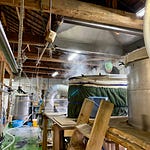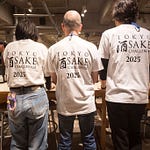Welcome to Issue #93 of SIN.
We have a mixed bag of news in this issue, but one type of story that seems to be appearing with unfortunate regularity is stories of breweries being affected by natural disasters. Typhoons, earthquakes and torrential rain are all sworn enemies of brewery structures that were constructed, in some cases, hundreds of years ago.
Some of the often-cited issues facing the industry are topics such as marketing, export, staffing and falling sales, however another serious reality facing the industry is deteriorating architecture. A few breweries have managed to rebuild and introduce modern structures into their facilities, but for many - or most breweries - such upgrades are financially impossible.
Whether this issue can be solved with government assistance, crowdfunding or outside investment remains to be seen, however it is an issue that's not going to go away so hopefully more breweries can find a way to fortify their structures and continue to make sake for many years to come.
And now for the news...
Floods Hit The North
Akita- Heavy rains hit Akita Prefecture, one of Japan's premier sake-producing regions, early in the month causing serious damage to a number of breweries in the region.
In Narayama, Akita City, where the flooding was most severe, Akita Jōzō, known for Yuki no Bijin, was submerged in water up to 50 cm.
Fortunately, the brewery had already finished its brewing for the current season, however tanks were submerged in muddy water and the kōji room was also flooded, requiring replacement of wall panels.
In the wake of the rains, volunteers from breweries, liquor stores and restaurants in surrounding areas helped clean up the brewery by removing mud and washing floors.
Yūsuke Sato, president of Aramasa Shuzō, who was one of the many that came to help, said, "Akita Jōzō has long been an important member of the Akita brewing community and we will continue to support them anyway we can."
Tadahiko Kobayashi, president of Akita Jōzō, said, "It is difficult to have something like this happen just as COVID has settled down and we are getting back on our feet, but we are very grateful for the help of our fellow breweries and restaurants."
Source - NHK
JG: It goes without saying that these stories are almost commonplace. All indications are that the severe weather will continue, too. Let us hope that all breweries that experience these things find the resiliency to continue. I’m sure they have been through worse!
秋田醸造 , ゆきの美人 , 新政酒造
COVID Matured Sake Released
Shiga- Like many other breweries across the country, Hata Shuzō and Yasui Shuzō endured a sharp drop in sales when the COVID pandemic hit in 2020.
At a time when many brewers were unable to move stock the two breweries decided to age their surplus sake in an effort to prevent contract farmers from drastically reducing their rice plantings for the next season, with the idea being they would sell the sake post-pandemic.
The sake was aged at both refrigerated and room temperature.
Daijirō Hata, of Hata Shuzō, said, "We are very satisfied with the result. Now that the pandemic has settled, I hope more people will return to enjoying sake."
The aged sake is being sold mostly through sake stores in the prefecture starting this month.
Source - NHK
JG: I have to admit I admire their foresight and their strategy. Maintaining rice supply channels is important, and many brewers did in fact lose those. I am sure their sake will draw support too, and with the age and proper marketing, be interesting to boot.
畑酒造 , 安井酒造
Lagoon To Go
Tokyo- Readers will be aware of the new license the government now offers for new breweries where seishu can be produced but only sold overseas. The producers may release sake adjacent products such as doburoku or sake with adjuncts domestically but any seishu (or official nihonshu) cannot be purchased within Japan.
Until now!
Listen to this episode with a 7-day free trial
Subscribe to Sake Industry News to listen to this post and get 7 days of free access to the full post archives.












